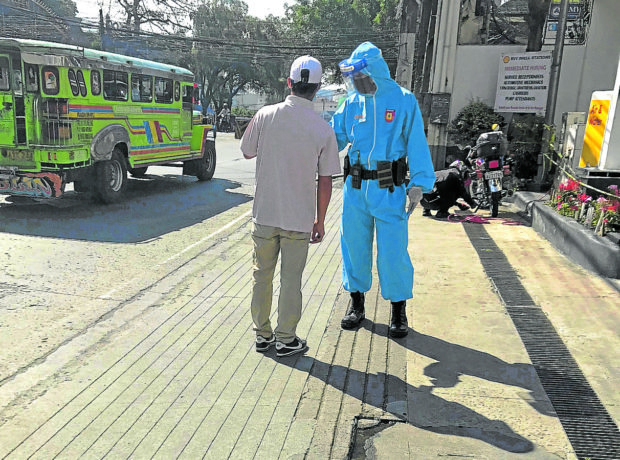
PROTECTED A policeman wearing a set of personal protective equipment talks to a man passing through a checkpoint in Baguio City’s business district. —VINCENT CABREZA
BAGUIO CITY, Benguet, Philippines — Computer-aided contact tracing and information gathered by police and medical investigators are helping the city stem the local transmission of the new coronavirus disease (COVID-19).
As of Tuesday, no new patients had been added to the 32 COVID-19 cases recorded in the city since the pandemic was declared in March.
But the city’s epidemiological team knew the location of 29 patients who beat the disease as well as those suspected of having been infected with the virus.
‘Like investigating’
Information about their whereabouts, their public activities and the profile and number of their neighbors was collected in an electronic tracking system, called “EndCov-19,” to help experts predict the possible transmission behavior of the disease in the city.
“Contact tracing is like investigating. The result of contact-tracing depends on the quality of information gathered and capacity of the contact-tracing team,” said Mayor Benjamin Magalong, a former chief of the police’s Criminal Investigation and Detection Group.
He outlined the city’s COVID-19 tracking methodology during a virtual briefing in Malacañang on Tuesday.
In March, Magalong sent personnel of the city health services office to look for people who had interacted with suspected infection cases.
It skirted a Department of Health (DOH) protocol of deploying contact tracing teams only after laboratory evidence of transmission had been established.
“Speed is a factor, every second matters,” Magalong said.
“Contact tracing is about speeding up containment,” Dr. Donnabel Tubera-Panes, head of the epidemiological team, said. “When tied with testing and the quick release of results, it is the cheapest way of preventing COVID-19.”
Policemen tapped
A key element in this “out-of-the-box” tracking system was the integration of policemen into the epidemiological team. They were helped by village health center personnel, data analysts and even volunteer firemen who served as data encoders.
Led by Lt. Col. Max Sumegang, 22 police officers were tapped to help patients remember their activities before they were tested for the virus.
“Recalling where you had been or who you met as far back as 10 days would be difficult. People we interviewed often had ready details about where they went a day before, Sumegang said.
“But the effectiveness of tracking down people who may have contracted the disease from a patient relies on accurate information,” he said.
He added: “They tire from each interview so we let them sleep it over. We interview them again when their minds are less stressed.”
According to Sumegang, verifying all details they obtained and requiring policemen or health workers to examine the places a COVID-19 patient last visited extend the tracking process to several days.
Real-time info
The EndCov-19 system (accessible through www.endcov19.baguio.gov.ph.) is constantly updated with “real-time information, through a collaboration of the police, the city’s management information and technical division and medical staff,” he said.
Sumegang said “good data” has helped doctors draw a picture of the level of local infection. For instance, the average age of people who caught the disease here is 46. All 32 cases involved patients as young as 8 days old and as old as 77 years.
According to a profile of COVID-19 cases in the city, 63 percent of patients suffered from “preexisting” medical conditions. It said 43 percent of patients were exposed to the disease at health facilities while 37 percent had traveled from Metro Manila and 10 percent from abroad.
A government employee is the only Baguio fatality attributed to the virus. She died before her infection was confirmed by the DOH.
For more news about the novel coronavirus click here.
What you need to know about Coronavirus.
For more information on COVID-19, call the DOH Hotline: (02) 86517800 local 1149/1150.
The Inquirer Foundation supports our healthcare frontliners and is still accepting cash donations to be deposited at Banco de Oro (BDO) current account #007960018860 or donate through PayMaya using this link .